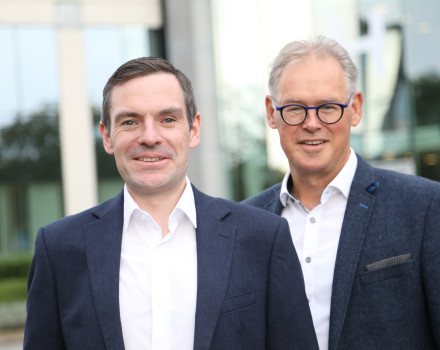Why do you look to recruit apprentices into your team?
It’s no secret that there’s a skills shortage in the engineering industry and offering apprenticeships is a great way of working towards addressing this. Recruiting enthusiastic people with a passion for engineering before they’ve achieved any qualifications means that we can work with them to develop skills that are relevant to what we do. The structured, on-the-job training an apprenticeship offers means they’re engaged, productive and constantly upskilling themselves so can contribute positively to our teams and wider business, whilst also fulfilling their own professional ambitions.
How have apprentices benefited your team and the wider business?
Our apprentices all bring a keenness and enthusiasm for learning that’s infectious. They encourage people to think differently, often challenging us to rethink why we do things a certain way. We also find that the mix of structured technical and on-the-job training means they are practically minded and able to offer pragmatic and workable solutions. For me, this makes them a very wise investment for the business. If you also factor in that there are a number of different funding opportunities, including the government apprenticeship levy, that can support training costs, allowing us to invest our people and time into ensuring our apprentices are given the best chance of success, this becomes even more evident. For a small commitment from the company, we get the best new talent with training and experience tailored to the work we do.
How are the apprentices mentored and developed?
We have a training programme in place which each of our apprentices will follow. This starts out at technician level, with the option to potentially progress to doing a degree apprenticeship. Throughout this they will work on projects, gaining industry experience and engineering awareness; work onsite and attend project meetings; learn to work in common industry software programmes such as Revit and Autocad; and develop their leadership and communication skills.
They’re all assigned a primary mentor, who supports them through the process from start to finish, providing guidance, critique and helping with identifying opportunities that will help them develop into the best engineer possible. We hold regular reviews with them to make sure they’re progressing as they want to be and are on track. It’s a very two-way process and we encourage them to work with us to ensure they’re gaining the experience and knowledge they need.
Do apprenticeships result in long-term hires?
Typically, yes, they do. At the end of the apprenticeship programme, you have a professional who is not only qualified but has the practical experience relevant to our business. This makes them very valuable hires for us.
As a company, we have a long history of taking people on through various schemes and giving them a career within the company. For example, one of our Associate Engineers, Steve Spencer, started on a youth training scheme (YTS) in 1985 and he since worked for BakerHicks for approximately 30 years. In Steve’s own words:
For me personally, I didn’t have any qualifications (suitable to engineering) when I came out of school. This route has given me a career which has allowed me to travel, working on some of the most prestigious projects around the world.
Do you have any advice for anyone thinking of taking the apprenticeship route into the industry?
An apprenticeship is a great way to start a career in engineering. You’ll be learning on-the-job and gaining invaluable knowledge from the wealth of experience held within our teams. You’ll work on some fantastic projects and be given the opportunity to experience a wide range of engineering applications, helping you to shape your career from the very start.
Any success stories you’d like to highlight?
There’s two from our current cohort of apprentices who really show the breadth of opportunity this route can offer:
Kayden Davies
Kayden was one of the first apprentices to come into the business through our current scheme. Before joining, he’d completed one year at college and was working with his dad in groundworks contracting. However, he had an interest in architecture and was learning in his own time from one of our Principal Technicians, who he knew. He completed an ONC at Salford College in his first year, before going on to do an HNC at Bolton University and achieved the Institution of Civil Engineering (ICE) EngTech in June 2022. He is now working towards Institution of Structural Engineering (IStructE) Technician membership.
Kayden is a fantastic example of how our apprentices make the most of the opportunities given to them at BakerHicks. He’s worked on major projects across both our Power and Life Sciences sectors, as well as being a key figure in supporting our new apprentices when they first enter the business, lending his knowledge and experience to help them on their apprenticeship journeys. He’s a highly valued member of the team with an excellent skillset and work ethic.
Dominic Fisher
Dominic joined us as an Apprentice Technician, having completed a two year Architecture course at college. Whilst at college, he’d realised that what he enjoyed most was the CAD work and that he didn’t want to go straight into a degree, preferring the sound of an apprenticeship where he could get the practical experience that he felt would be most valuable to him.
Dominic completed his HNC in Built Environment at Solihull College in two years. His manager saw potential in him and put him forward for a degree apprenticeship. He’s now currently in his second year of a BEng in Civil Engineering at Coventry University, with the potential to gain IEng status with the Institution of Civil Engineering (ICE) and go on to study at masters level.
He’s worked on several projects, mainly in civils and the coordination of underground services, across the Public Sector. He’s also recently become a mentor to the newest apprentices in our Warwick office, providing day-to-day guidance and support. He’s extremely well thought of by his manager and the team. His contributions to projects and the work environment are both excellent, and, without doubt, he’s fulfilled the potential identified in him right at the start.







